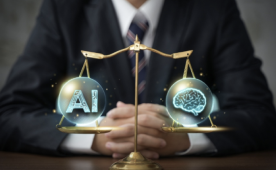The rapid development of artificial intelligence (AI) has had a profound impact on the legal field, and it is poised to continue revolutionizing the way that we practice law in the future. Legal professionals around the world are pondering the same question: can AI be used ethically and effectively in the sector? For many of them, the answer is ‘yes’. While it is important to always factcheck and ensure that the information you receive is correct, AI has many benefits for practicing lawyers as they conduct research.
Is AI a substitute for human expertise?
We’re hearing more and more about the possibility of AI ‘taking our jobs’. The general idea is that AI can do what human workers can do more quickly, accurately and cheaply. Luckily for legal professionals, this is not quite the case. Human expertise reigns supreme in most fields. This is especially true in legal work, which is focused on detailed knowledge of sometimes obscure case law. Experts in their field such as Samuel L Bray, an experienced attorney with roughly 20 years in the industry, bring quite a lot to the table, including applied experience and a more detailed understanding of sometimes complex legal cases than AI can muster.
With all of that said, there are many areas where AI can be used to improve the quality of work that clients receive. Below, we look more closely at how legal professionals are utilizing AI in their research, including using legal expertise to embellish and refine AI-designed content.
How AI is used in legal research
AI is primarily used in the legal field to help attorneys conduct research and automate tedious tasks that would otherwise be billed to clients. This not only allows lawyers to spend more time on the aspects of a case that truly matter, but also potentially lowers the amount of money that clients have to pay. There are a few different ways that AI is used in legal research, and we’ll look at two of the most important in this article:
- Data discovery
- Data analysis
Data discovery
If there is one insight to take away from legal research, it is that the legal system contains massive amounts of information. For nearly 300 years, lawyers have played a huge role in building and maintaining society in the US. To put this into perspective, in 2022 alone, state attorneys collectively handled roughly 64 million cases. This information comes from the National Center for State Courts, a non-profit organization dedicated to tracking the legal system in the US specifically. In 2019, that number was even higher at 83 million.
There are, quite literally, billions of cases that lawyers must sift through when looking for relevant law to help their clients’ cases. Even whittling this number down on a state-by-state basis (rather than the collective pool of incoming cases across the country described above) yields millions of new cases every year. Not only is there a huge backlog to sift through in the legal system, in other words, but there is also an astounding number of new cases that might contain information relevant to specific legal proceedings.
Attorneys have one main job when conducting research. They sort through as many cases as possible to find information that benefits their clients. AI can help with this task by quickly analyzing hundreds or thousands of legal documents from both the past and present and presenting lawyers with potentially relevant results. Lawyers then read through these results, find the documents that are most applicable to their area of interest, and use them as they build a case.
AI makes the research process much faster and focused thanks to its ability to sort through large amounts of data in a handful of minutes.
Data analysis
Once the relevant documents have been found, AI helps attorneys analyze common trends and insights in them. It is more adept at picking up on potential issues than the human eye alone. With this data analysis comes an enhanced ability to tightly define the focus of future research. Again, this is much easier to do when working with AI than it is when sorting through hundreds of case files on your own. It is also worth noting that AI tools can often take even niche legal areas and find support for relatively novel issues. This saves attorneys from spending dozens of hours looking into law that isn’t their area of expertise.
It’s important to note here that AI must be checked by legal professionals to ensure accuracy! AI-based tools are not a ‘set it and forget it’ legal solution.
AI can help lawyers conduct more effective research in a shorter time
From finding relevant cases to analyzing large numbers of files, AI tools can help lawyers conduct more effective research in a shorter time. This enables attorneys to spend more time crafting tailored and effective cases designed specifically for their clients. What do you think about using AI in the legal field?




